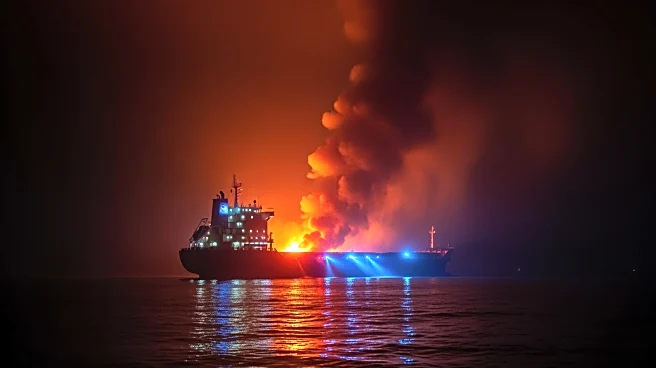What is the story about?
What's Happening?
Syrian President Ahmed al-Sharaa made his debut on CBS's '60 Minutes,' where his interaction with correspondent Margaret Brennan drew significant attention. The interview began with Brennan referencing President Trump's past comments, describing al-Sharaa as 'handsome' and 'tough.' Al-Sharaa responded with a smile, asking Brennan if she had any doubts about his attributes. The exchange quickly gained traction online, with viewers jokingly dubbing al-Sharaa 'President Rizz,' a term from Gen Z slang meaning charisma. Brennan shifted the conversation to al-Sharaa's past as a leader of Jabhat al-Nusra, an Al-Qaeda-affiliated group, highlighting the $10 million bounty that was on his head until recently. Al-Sharaa dismissed the bounty as a waste, attributing his past militancy to youthful mistakes. The interview marked al-Sharaa's first major appearance on American television, following his rise to power after Bashar al-Assad's regime collapsed.
Why It's Important?
The interview is significant as it highlights the evolving political landscape in Syria and the U.S.'s cautious optimism regarding the new Syrian government. Al-Sharaa's attempt to rebrand himself as a reformer and statesman is crucial for Syria's future, especially after the U.S. lifted sanctions and dropped the terrorist designation of his forces. The interaction also underscores the complexities of international diplomacy, as the U.S. encourages Syria to recognize Israel under the Abraham Accords. While the White House views Syria's outreach as promising, skepticism remains among U.S. officials regarding al-Sharaa's pledges of moderation. The interview serves as a pivotal moment in Syria's political transition, impacting U.S. foreign policy and regional stability.
What's Next?
The next steps involve monitoring Syria's political transition and the U.S.'s engagement with al-Sharaa's government. The White House may continue to assess the Syrian leader's commitment to reform and moderation. Potential reactions from international stakeholders, including Israel and other Middle Eastern countries, could influence the diplomatic landscape. The U.S. may also evaluate the impact of lifting sanctions and the terrorist designation on regional security. Al-Sharaa's future actions, particularly regarding his past affiliations and current policies, will be crucial in determining Syria's path towards stability and peace.
Beyond the Headlines
The interview raises ethical questions about the portrayal of political figures and the influence of media on public perception. Al-Sharaa's attempt to distance himself from his militant past highlights the challenges of rebranding in the political arena. The exchange also reflects cultural dimensions, as Gen Z slang and social media reactions play a role in shaping narratives. Long-term implications include the potential shift in U.S.-Syria relations and the broader impact on Middle Eastern geopolitics. The interview serves as a reminder of the power dynamics at play in international diplomacy and the role of media in shaping political discourse.















